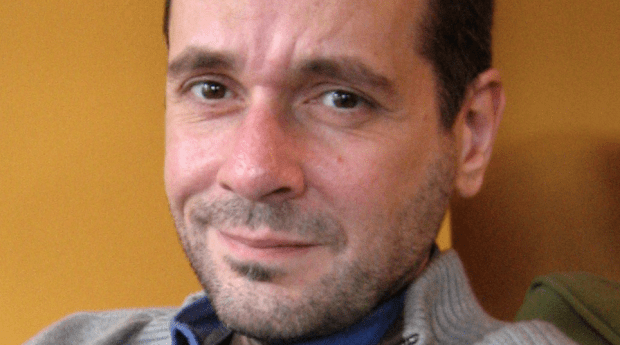Mason Braithwaite is ready to give Miss Marple a run for her money. Created by Ottawa-born author Christopher Church, Braithwaite is a gay psychic detective and the protagonist of Church’s new mystery novel, Signs Point to Yes. Xtra chatted with Church about sleuthing, queer representation in the mystery genre and why he plans to keep his series non-lethal.
Xtra: Your mystery series has a novel twist: no one dies. Why did that angle appeal to you?
Christopher Church: I think murder is an appealing trope when it’s not a personal experience. While I lived in Ottawa and Calgary, I never knew anyone who got murdered, and it never came anywhere near me. But in Los Angeles, the culture is different, and murder is a lot more present and part of everyday life. Off the top of my head, I can think of three people in my circle who have been shattered by the murder of a loved one. So, the idea of creating a story where no one dies is an escape from reality, the way a pulp murder mystery was an escape from reality when I lived in safer places.
What’s your hero, Mason Braithwaite, like?
Mason is a guy who’s trying to shift his way of living from reacting to things into taking action. The plan through the first few books is that he’s learning how to do that. He’s not the brightest guy when it comes to social conventions or reading other people, but he’s sorting out his priorities, and at his core he is a deeply moral person, loyal to his friends and trying to do what’s right.
What makes him stand out from other detectives in the genre?
He’s atypical because he’s not especially clever or functional, but he manages to figure things out. His psychic powers are also atypical of psychic detectives (can you believe that’s an entire subgenre?), but he doesn’t really understand how it works or how to control it.
What’s your take on LGBT representation in the mystery genre?
There was a period where it seemed like we were seeing more gay characters in literature and film, but at the same time they were getting killed off, as if they were being punished for being gay. That is the downside of gay people not taking charge of things ourselves. In the last decade or so, my sense is that fiction has been evolving in the right direction; there are positive gay protagonists who don’t need to die and don’t hate themselves.
Where would you like to see that evolution take us?
I think the only people who can queer up the detective genre is us: the queer writers. We have the responsibility to create engaging gay characters. I hope to see more gay characters who are dynamic, who aren’t victims and who can think about things besides sex. I wanted Mason to be a gay man with a pedestrian sex life. He has extraordinary experiences but not an extraordinary sex life.
How many Mason Braithwaite Mysteries do you plan to write, and where do you see them going?
I have a concept for six books in the series. He’s going to get deeper into his psychic experiences, I think, and become more confident and skilled in that field. In the second book, which is in progress, he and his roommates spend a long weekend in the Mojave Desert. Unlike a lot of people in Los Angeles, I think I have a desire to get out of town, get into the wilderness, so I’m taking Mason out there. So many Canadians I know have that instinct, too: going to the cottage or out into the woods for the weekend, just getting into nature for a while. It surprised me that it’s unusual here; in Canada it was always such an ordinary thing, a shared experience that everyone understood even if they didn’t do it very often.
Signs Point to Yes is available through Ingram publishing.

 Why you can trust Xtra
Why you can trust Xtra


